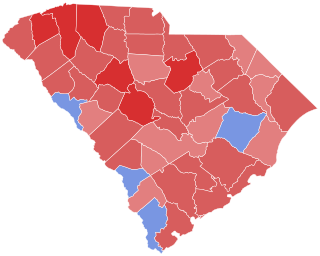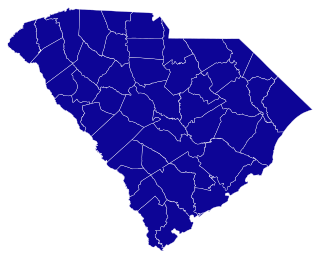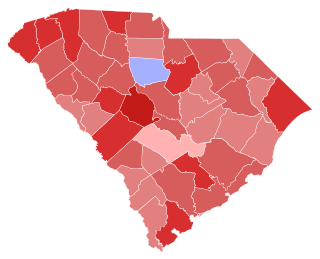A strum is the act of brushing one's fingers over the strings of a string instrument.
Contents
Strum may also refer to:
A strum is the act of brushing one's fingers over the strings of a string instrument.
Strum may also refer to:
Hassan, Hasan, Hassane, Haasana, Hassaan, Asan, Hassun, Hasun, Hassen, Hasson or Hasani may refer to:

James Strom Thurmond Sr. was an American politician who represented South Carolina in the United States Senate from 1954 to shortly before his death in 2003. Prior to his 48 years as a senator, he served as the 103rd governor of South Carolina from 1947 to 1951. Thurmond was a member of the Democratic Party until 1964 when he joined the Republican Party for the remainder of his legislative career. He also ran for president in 1948 as the Dixiecrat candidate, receiving over a million votes and winning four states.

Lake Strom Thurmond, officially designated J. Strom Thurmond Reservoir at the federal level, and Clarks Hill Lake by the state of Georgia, is a man-made reservoir at the border between Georgia and South Carolina in the Savannah River Basin.
Clarks Hill or Clark Hill can refer to some places in the United States:
Duras may refer to:
Strom may refer to:

The 1996 South Carolina United States Senate election was held on November 5, 1996 to select the U.S. Senator from the state of South Carolina. Popular incumbent Republican Senator Strom Thurmond, won re-election against Democratic challenger Elliott Springs Close for a seventh full term in office. The margin, however, was one of the closest in Thurmond’s 48-year Senate career. At the age of 93 years, 11 months and 3 days, Thurmond became the oldest person ever to be re-elected to the United States Senate. He eventually served out the entirety of what would be his final term and left the Senate on January 3, 2003, at age 100 years and 29 days.
Latino or Latinos refers to:

The 1990 South Carolina United States Senate election was held on November 6, 1990 to select the U.S. Senator from the state of South Carolina. Popular incumbent Republican U.S. Senator Strom Thurmond cruised to re-election against Democratic challenger Bob Cunningham.

The 1966 South Carolina United States Senate election was held on November 8, 1966 to select the U.S. Senator from the state of South Carolina simultaneously with the special election to fill out the remainder of Olin D. Johnston's term.

The 1956 South Carolina United States Senate special election was held on November 6, 1956 to select the U.S. Senator from the state of South Carolina simultaneously with the regular Senate election. The election resulted from the resignation of Senator Strom Thurmond on April 4, 1956, who was keeping a campaign pledge he had made in the 1954 election. Thurmond was unopposed in his bid to complete the remaining four years of the term.

The 1984 South Carolina United States Senate election was held on November 6, 1984 to select the U.S. Senator from the state of South Carolina. Popular incumbent Republican Senator Strom Thurmond cruised to re-election against Democratic challenger Melvin Purvis.

The 1960 South Carolina United States Senate election was held on November 8, 1960 to select the U.S. Senator from the state of South Carolina. Popular incumbent Senator Strom Thurmond easily won the Democratic primary and was unopposed in the general election.

The 1972 South Carolina United States Senate election was held on November 7, 1972 to select the U.S. Senator from the state of South Carolina. Popular incumbent Republican Senator Strom Thurmond easily defeated Democratic challenger Eugene N. Zeigler. This marked the first time that a Republican was re-elected Senator from the state, and the first time since 1872 when that person won consecutive elections.

The 1978 South Carolina United States Senate election was held on November 7, 1978, to select the U.S. senator from the state of South Carolina. Popular incumbent Republican Senator Strom Thurmond defeated Democratic challenger Charles D. Ravenel.

The 1950 South Carolina United States Senate election was held on November 7, 1950, to select the U.S. Senator from the state of South Carolina. Incumbent Democratic Senator Olin D. Johnston defeated Strom Thurmond in a bitterly contested Democratic primary on July 11 and was unopposed in the general election.
Thomas Moss is the name of:
Thurmond is a surname.

On August 28, 1957, Strom Thurmond, then a Democratic United States senator from South Carolina, began a filibuster intended to prevent the passage of the Civil Rights Act of 1957. The filibuster—an extended speech designed to stall legislation—began at 8:54 p.m. and lasted until 9:12 p.m. the following day, a duration of 24 hours and 18 minutes. This made the filibuster the longest single-person filibuster in United States Senate history, a record that still stands as of 2023. The filibuster focused primarily on asserting that the bill in question, which provided for expanded federal protection of African American voting rights, was both unnecessary and unconstitutional, and Thurmond recited from documents including the election laws of each U.S. state, Supreme Court decisions, and George Washington's Farewell Address. Thurmond focused on a particular provision in the bill that dealt with certain court cases, but opposed the entirety of the bill.